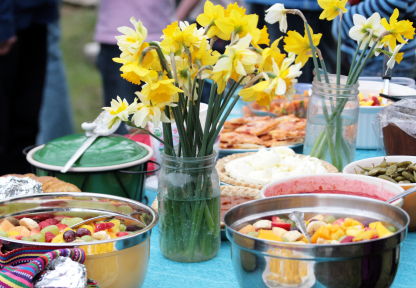I’m often asked how I have so many spiritual conversations with students. Some wonder how I “make space for God” in my classrooms since many of my students express interest in learning more about Christianity after taking my writing courses. Other faculty might question why students are suddenly sitting next to my family at church or why a student is talking about the Bible in office hours.
There’s no secret strategy. I’m not forcing or baiting. I’ve just learned this: the best way to make space for God is to make space for students.

I spend a portion of my class lectures establishing rapport. I learn names, I listen to childhood experiences, I ask about pets and sports and favorite meals and worst movies they’ve seen. I ask about YouTube videos they watch over and over or music they’re buying on iTunes. I even ask about hangovers. In that ten minute banter before I start my lesson for the day, I’m asking questions to build rapport with my students. And just as importantly, I’m sharing about my own life. I talk about my marriage, my children, my writing projects, my research, and my big life questions.
I devote myself to building community in my classroom. My goals include creating an atmosphere of vulnerability and trust so authentic that writing happens. I recognize the dignity of every student; every student’s voice matters deeply. When they feel seen, heard, and honored (even if they’ve had too much to drink the night before) they want to ask life questions that the writing assignments might trigger. I’ve made the space for that to happen. And because I love God and am indwelt by the Spirit, that’s a spiritual space. It’s a spiritual place because I’m in it.
An entire class of students comes to my house with food for a huge potluck. This isn’t part of the job description of a college instructor, and I know it’s unusual—at least at a big state school—to invite students into your home.
I’m supposed to keep my professional distance.
But my undergraduate education at the University of Virginia ruined me regarding professional distance. In those days, I dined with professors nearly every evening. As part of the Jeffersonian ideal of the “academic village,” professors joined students in dining halls or invited them into their homes for dinner, dessert, or coffee. Some of my favorite memories from college have to do with meeting my instructors outside of the classroom. I remember walking into the living room of my English professor and sitting around a table with a group of other students and just talking — like it was an ordinary, everyday thing — about beauty.
Another professor, Rita Dove — the Poet Laureate of the United States at the time and a Pulitzer Prize winner — actually hosted class in my dorm room. She actually sat on my bed and talked to me about my poems. The other students sat in a circle on my floor.
In those conversations with professors, I talked about my life. I talked about things I hoped for and things I cared about. Those conversations changed me forever. How could I not feel like I’d entered a portal into adulthood, into intellectual communities that wanted to hear my voice?
Those conversations made me feel truly adult, truly independent. It was college at its best.
My class piles into my living room, and one student plays her guitar while others sing around the piano. We talk about creativity, future careers, and the burden of having to decide how to choose a career when you love too many things. And these students actually want to talk about their writing projects. They pose questions, make comments, and grapple with their revision process all the while petting my cats and eating homemade apple pie. One student says, “Dr. H., I want to write my memoir about this,” as she gestures to our group gathered about her.
I have to force them out the door so I can go to bed.
When most people think of the college scene, they visualize the alcohol and the parties. But for at least this one night, a group of students sat around and talked about ideas — not because anybody was taking attendance — but because they wanted to be together and share their ideas and their lives. That’s what makes college so good.
The space I make for students means I invite them to dissolve that boundary between the professional and the personal. I can’t think of any other way to teach. I’ve tried, and it’s just not the real me. So students come find me. They want to talk about their lives, and I want to listen. One mentor told me great teaching was this: love of subject, love of student. I pray I love well.
A version of this piece was originally published on Heather’s blog, Live with Flair.